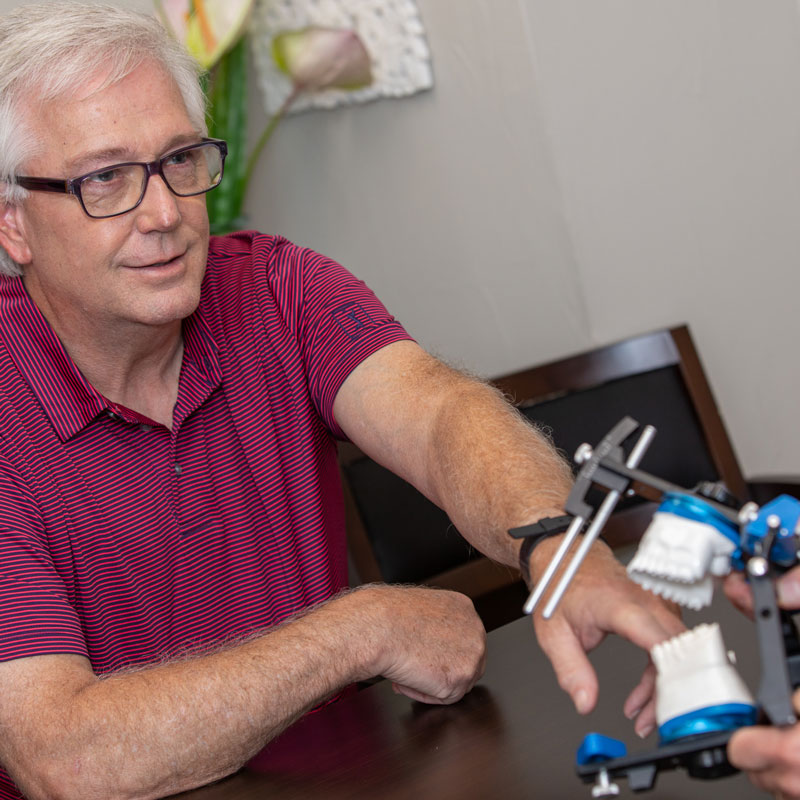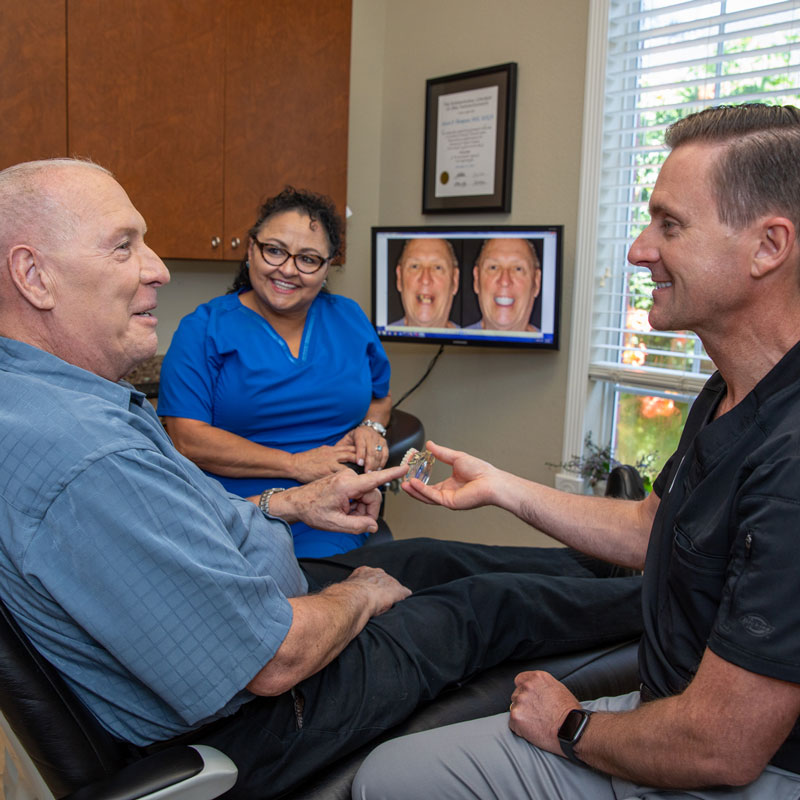Dental Implants
Plano’s Premier Destination for Dental Implants
Whether you have one or several missing teeth, it can be difficult (or even impossible) to eat, speak, and smile with confidence. Dental implants are considered the most advanced method of tooth replacement by the team at Imagecare Dental Group in Plano, TX.

Reasons to Choose Dental Implants
- Impressive Durability: Dental implants are built to last a lifetime, and the results are incredibly long-lasting. The American Academy of Implant Dentistry has reported that implants have a 98 percent longterm success rate.
- Strong Support: Dental implants are a great choice for patients who need dentures because they keep your restoration in place when you eat and talk. With dental implants, there is no risk of clicking, slipping, or other denture mishaps. Your restoration will stay in place just like your natural teeth would. Furthermore, unlike traditional bridges or traditional dentures, they also help maintain a healthy jawbone.
- Stunning Results: By replacing a missing tooth, dental implants can help you feel more confident when you speak, smile, or eat. Our dentists combine personalized planning, advanced technology, and premium materials to deliver beautiful, lifelike results that patients are proud to show off. When designing your crown, bridge, or dentures, we take every facial feature into account to create a smile that truly represents you.
One of Our Before & After Dental Implant Cases


Replace Missing Teeth With Unparalleled Stability
Dental implants can replace any number of missing teeth and improve your oral health. Unlike traditional restorations, implants restore the tooth roots and protect against bone recession. Imagecare Dental Group offers this life-changing procedure to give you back all the dental function you once enjoyed with a full smile.

A Healthy, Complete Smile Is a Click or Call Away
Whether you are missing a single tooth or a full arch, our doctors can help you rebuild your smile and boost your self-confidence with dental implants. Our dentists have extensive training in the field of implant dentistry and are members of many professional organizations, including:
- Academy of General Dentistry
- International Congress of Oral Implantologists
- American Dental Association
- American Academy of Cosmetic Dentistry
- Texas Dental Association
If tooth loss is hindering your quality of life on a daily basis, dental implants can be a life-changing solution. To learn more, request your dental implant consultation online or call our Plano, TX, office 972-618-5000.
Don’t Qualify? Don’t Worry.
If you don’t qualify for dental implants at our Plano, TX, office right away, don’t worry. We can help you become a candidate using methods such as:
Our doctors can use bone grafting to replace recessed tissue in the jaw, clear gum infection with periodontal treatment, and provide other treatments to make your jaw able to accommodate implants for the rest of your life.
Our Plano, TX, office also provides All-on-4 dentures. For patients who have suffered some degree of jaw atrophy after tooth loss, this technique makes it possible to receive implant-supported dentures without a preparatory bone grafting procedure.
What Exactly Is a Dental Implant?
A dental implant is a bionic tooth root made from medical-grade titanium. Why titanium? In addition to being one of the strongest metals on earth, titanium is incredibly lightweight and biocompatible with your body. This means that the titanium implant will fuse to your jaw just as your natural tooth roots would. These factors make it an ideal choice for dental implants and other prosthetics that go into the body.
Besides being light and strong, titanium also has the ability to fuse with human bone tissue during a process known as osseointegration. To assist with osseointegration, the surface of a dental implant is ridged like that of a screw, allowing it to fuse with the jawbone much more effectively.
Understanding how implants work and what benefits they can offer is a key step in determining whether they are right for your needs.

Do You Qualify for Dental Implants?
Even if you have jawbone recession or preexisting health issues, our doctors can help you get your oral and overall health where it needs to be. To find out if you qualify for implants, schedule a screening at our Plano, TX, office today. Request your appointment online or call us 972-618-5000.
Before Performing Implant Treatment, We’ll Evaluate Your:
Dental implants require a sufficient amount of dense, healthy jawbone. Patients who have suffered jawbone atrophy as a result of trauma, gum disease, or extensive tooth decay might require bone grafting, or they may be better candidates for alternative techniques like All-on-4® implants.
Smoking is directly linked to poor outcomes in dental implant patients. Most doctors will require you to quit using any type of tobacco several months before you can be approved for surgery.
Healthy gums are also integral to a strong foundation for your implants. If you suffer from gum disease, our doctors can first provide periodontal treatment to improve your eligibility for the procedure.
Certain conditions, such as poorly controlled diabetes, can increase your risk of complications. It is extremely important to disclose all health concerns and medications to your dentist at our Plano office.

Why Is Advanced Technology Important When It Comes to Dentistry?
When it comes to dentistry, advanced technology is an essential part of every step. From planning your surgery to designing your custom crown, bridge, or dentures, our Plano doctors incorporate state-of-the-art technology from start to finish. We plan and place implants with a digital planning software that determines the ideal location for your implants using your computed tomography (CT) images. While not always necessary, we believe that digitally guided placement ensures:
- More accurate placement
- Higher success rate of integration
- Faster surgical and recovery time
- Better aesthetic outcomes
For some patients, we can also provide Teeth in a Day so you can enjoy the benefits of dental implants quicker than ever before. If you are unsure whether a certain treatment is right for you, we can create a smile design so you can preview your results.

How Much Do Dental Implants Cost?
At Imagecare Dental Group, we always strive to provide quality service at a fair price. For most patients, the cost to replace a single tooth starts at $102 per month and includes your implant, abutment, and crown.
Dental implants are typically more expensive than traditional methods of tooth replacement including dental bridges and conventional dentures. Additionally, because they are considered “elective,” they are not always covered by insurance. However, implant-supported restorations offer various benefits that conventional bridges and dentures do not, making them a great investment in your oral health.
Remember: every implant treatment at our Plano, TX, practice is personalized to the needs, goals, and budget of the individual patient, so the only way to receive an accurate quote is to schedule a consultation.
Sounds Expensive
Can I Really Afford Dental Implants?
We understand that dental implants are a big expense, so we offer several options to make dental implants affordable, regardless of your budget.
Our office accepts most types of dental insurances. While dental insurance doesn't cover dental implants, it may cover associated expenses. As a courtesy, our team will gladly file claims on your behalf.
We also accept most major credit cards. If you have a credit card with generous benefits, you can earn rewards by using your credit card to pay for your dental treatment.
We work with many third-party lenders including CareCredit®, Proceed Finance, and LendingClub®. Qualifying patients can enjoy low-interest rates and flexible repayment terms.
If you do not have dental insurance but you still wish to save, you can also sign up for our in-house membership plan.
Contact Imagecare Dental Group & Book Your First Consultation Today
Losing a tooth does not have to be a permanent situation. With the help of our dentists, you can replace missing teeth and enjoy a fully functional smile in just a few months.
A fully restored smile is just a click or call away. Request your first consultation online or call our Plano, TX, office 972-618-5000.




